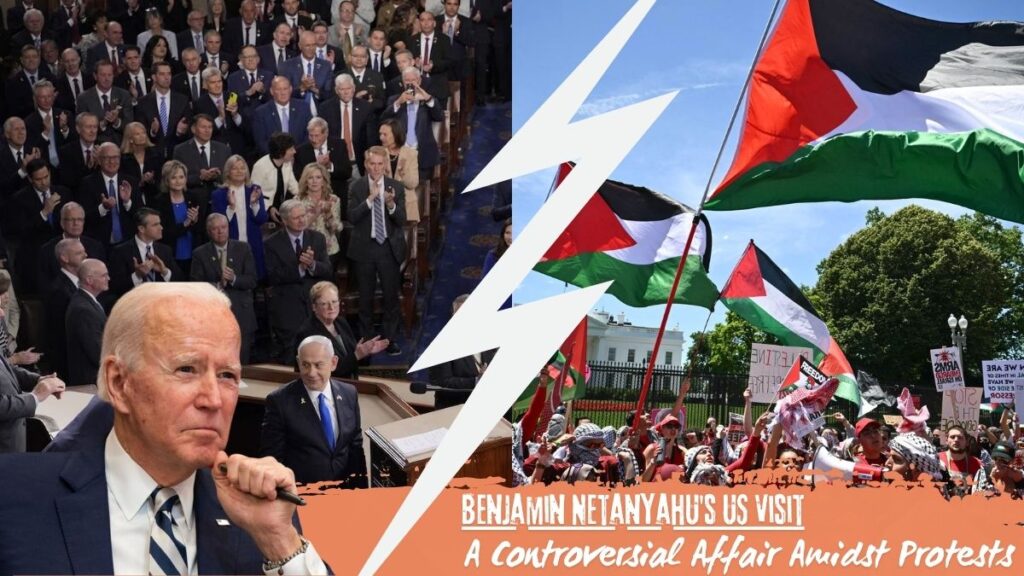Benjamin Netanyahu’s US Visit: A Strong Statement Amidst Controversial Protests
Benjamin Netanyahu’s recent US visit sparked significant controversy, drawing global attention. Amidst intense protests, including unconventional demonstrations at his hotel, Netanyahu delivered a powerful speech to Congress, receiving a record 58 standing ovations. His bold remarks addressed the protesters and highlighted the shared threats faced by the US and Israel, particularly from Iran. This visit underscores the complex and often contentious nature of international diplomacy

Benjamin Netanyahu's US Visit: A Controversial Affair Amidst Protests
Benjamin Netanyahu’s US Visit has become the focal point of global attention due to the surprising manner in which he was received and the powerful statements he made during his stay. The international media is abuzz with the events surrounding his visit, which have sparked intense reactions worldwide.

Protesters’ Unconventional Welcome
The Washington DC hotel, Water Gut Hotel, where Netanyahu was to stay, became the epicenter of a unique protest. Supporters of Gaza filled the hotel with grubs and worms, even throwing them in areas where Netanyahu was expected to be. The hotel had to undergo extensive sanitization before it could be reopened. Despite this unusual and intense welcome, Netanyahu remained unfazed.

A Record-Breaking Speech
In response to the protests, Netanyahu delivered an iconic speech in the US Congress. He received 58 standing ovations, surpassing the previous record of 28 set in 2015. This unprecedented support from US parliamentarians sent a clear message to the world: the United States stands firmly behind Israel. Netanyahu’s speech was not just a reaction to the protests but a declaration of Israel’s stance on various issues, including its relationship with the United States and the threats posed by Iran.
The Protests: A Diverse Crowd
The protests against Netanyahu’s visit saw participation from Palestinians, Pakistanis, and immigrants from various Muslim-majority countries living in the US. The demonstrators, many of whom were young students influenced by online content, held signs supporting Gaza. The Washington DC police attempted to control the crowd using pepper spray and baton charges, but the protesters persisted in large numbers. However, the protests remained largely non-violent.
Netanyahu’s Bold Remarks
During his speech, Netanyahu addressed the protesters directly. He compared their actions to chickens supporting KFC, highlighting the irony of their stance. He further emphasized the shared threat posed by Iran to both the US and Israel. Netanyahu’s remarks about Iran’s alleged plans to spread radical Islam worldwide were particularly controversial. He called for a united front between the US and Israel to counter these threats.
The Trump Factor
Netanyahu also touched upon the influence of former US President Donald Trump on US-Israel relations. Trump’s tenure saw significant pro-Israel policies, including the recognition of Jerusalem as Israel’s capital and the signing of the Abraham Accords. Netanyahu suggested that a return of Trump to power could further strengthen US-Israel ties and increase pressure on Iran. This prospect has been met with mixed reactions, especially among Palestinians who view Trump’s policies as detrimental to their cause.
US Perspective
The United States has long been a staunch ally of Israel, and Benjamin Netanyahu’s US Visit reinforced this enduring partnership. The unprecedented 58 standing ovations Netanyahu received during his speech in Congress underscored the depth of support for Israel within the US political establishment. This support is not just symbolic but is rooted in shared strategic interests, historical ties, and common democratic values.
However, Netanyahu’s visit also exposed the divisions within American society regarding US foreign policy, particularly concerning the Israel-Palestine conflict. The protests, largely led by Palestinians, Pakistanis, and other Muslim-majority immigrants in the US, reflected growing domestic opposition to certain Israeli policies, especially regarding Gaza. These protests, despite being non-violent, highlighted a significant portion of the American populace that is critical of the US’s unwavering support for Israel, advocating for a more balanced approach to the Israel-Palestine issue.
Questions for Readers:
- What are your thoughts on Netanyahu’s comparison of protesters to chickens supporting KFC?
- Do you think Trump’s return to power would impact the Israel-Palestine conflict? How?
Your opinions matter! Share your answers in the comments below and join the discussion.




